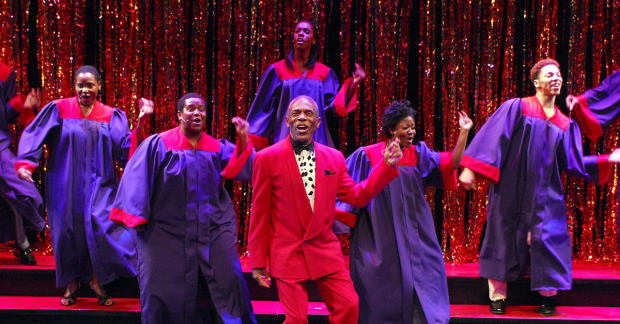
(© Stephanie Berger Photography)
Theaters across the country have been shut down due to the ongoing public health crisis. Now more than ever, arts organizations could use your donations to help sustain themselves for future seasons. If you have money to spare for donations, here are 10 historic African-American theaters and companies for you to consider.
The August Wilson African American Cultural Center
This nonprofit organization is based in downtown Pittsburgh and celebrates the contributions of African American artists to national and international culture. The center curates exhibitions and performances that explore the issues of identity that Wilson tackled in his body of work, as well as presents the yearly Pittsburgh International Jazz Festival, the Black Bottom Film Festival, and numerous community days for free, family-oriented events.
Founded in 1972, the Billie Holiday Theatre is one of the cultural institutions run by the Bedford Stuyvesant Restoration Corporation and its RestorationArt initiative. This Brooklyn-based theater produces new contemporary African-American plays and musicals at affordable prices, and served as an early theatrical home to artists such as Samuel L. Jackson, Debbie Allen, Samm-Art Williams, and Smokey Robinson. Its programs include the Black Arts Institute, an acting program offered in partnership with Stella Adler Studio, and a Youth Arts Academy, which offers lessons in drama, ballet, West African dance, and African djembe drumming.
This Chicago-based company, founded in 1976 by actress and producer Jackie Taylor, uses theater and educational outreach programs in an effort to eradicate racism and its damaging effects on society. In addition to original productions, its outreach initiates include Plays With a Purpose, a series of interactive musicals designed to teach students positive life lessons, the Black Playwrights Initiative, which helps develop the skills of local African-American dramatists, and Summer Job Training for Youth, which provides inner-city teens with eight weeks of training that will enable them to have a career in technical theater.
The Classical Theatre of Harlem
Celebrating its 20th anniversary this year, the Classical Theatre of Harlem is a professional theater company dedicated to reimagining classics and developing new work, while providing educational and literary programs at little or no cost to underserved communities in Harlem and beyond. Engaging with Harlem residents, businesses, schools, and community organizations, it benefits 18,000 people per year.
Founded by actor Wren T. Brown, Ebony Repertory Theatre is the first and only professional African-American theater company in Los Angeles. It develops and nurtures theater rooted in the experience of the African Diaspora, and has presented award-winning productions ranging from A Raisin in the Sun to Five Guys Named Moe.
Houston's Ensemble Theatre was founded in 1976 by the late George Hawkins to preserve African American artistic expression and enlighten, entertain, and enrich a diverse community. Decades later, the theater has evolved from a touring company to being one of Houston's finest historical cultural institutions. The Ensemble is one of the only professional theaters in the region dedicated to the production of works portraying the African American experience, is the oldest and largest professional African American theater in the Southwest, and holds the distinction of being one of the nation's largest African American theaters owning and operating its facility and producing in-house.
Harlem Stage commissions, incubates, and presents work that respond to the historical and contemporary conditions that shape our lives and communities. For more than 35 years, it has celebrated the diverse artistic legacy of Harlem and its impact on American culture through presentations of theater and works, musical performances, and more. Its roster of artists includes Bill T. Jones, Nona Hendryx, and Stew.
National Black Theatre is among the oldest black theaters in the country, and one of the longest owned and operated by a woman of color. Founded by the late Dr. Barbara Ann Teer in 1968, the theater reflects her lifelong commitment to community service through the arts, and produces theatrical experiences that tell authentic stories of the Black experience. It has toured over 300 original theater works around the United States, the Caribbean, Central America, Africa, and Asia, and also provides producing, directing, and playwriting residences for emerging black theater artists.
Based in Saint Paul, Minnesota, Penumbra Theatre creates productions that illuminate the human condition through the lens of the African-American experience. Its goals include creating public awareness of the African-American contribution to the American theater and maintaining a black performing arts community. Each year, Penumbra's shows are performed for more than 40,000 people, with more than 5,000 students receiving educational outreach workshops. It employs more actors, directors, and administrators of color than all the other theaters in Minnesota combined.
Based in Des Moines, Iowa, Pyramid Theatre Company provides a means of artistic expression to emerging Black voices, while providing theater rooted in the lessons of the past so as to serve the needs of the present. Cofounded by artistic director Jiréh Breon Holder (Too Heavy for Your Pocket) and now run by founding member Tiffany Johnson, the theater has presented classic works like A Raisin in the Sun and Intimate Apparel, and was scheduled to produce Jackie Sibblies Drury's Pulitzer-winning Fairview in August, production that was canceled due to the ongoing pandemic.
Kenny Leon's True Colors Theatre Company
Atlanta-based and founded in 2002, Kenny Leon's True Colors Theatre celebrates the tradition of black storytelling while giving voice to artists of all cultures. One of its many important programs is the National August Wilson Monologue Competition, an arts education program for high school students that offers free workshops, an all-expenses paid trip to New York for finalists, and the opportunity to not only attend a Broadway show, but perform a monologue from one of Wilson's plays on a Broadway stage during the competition.









